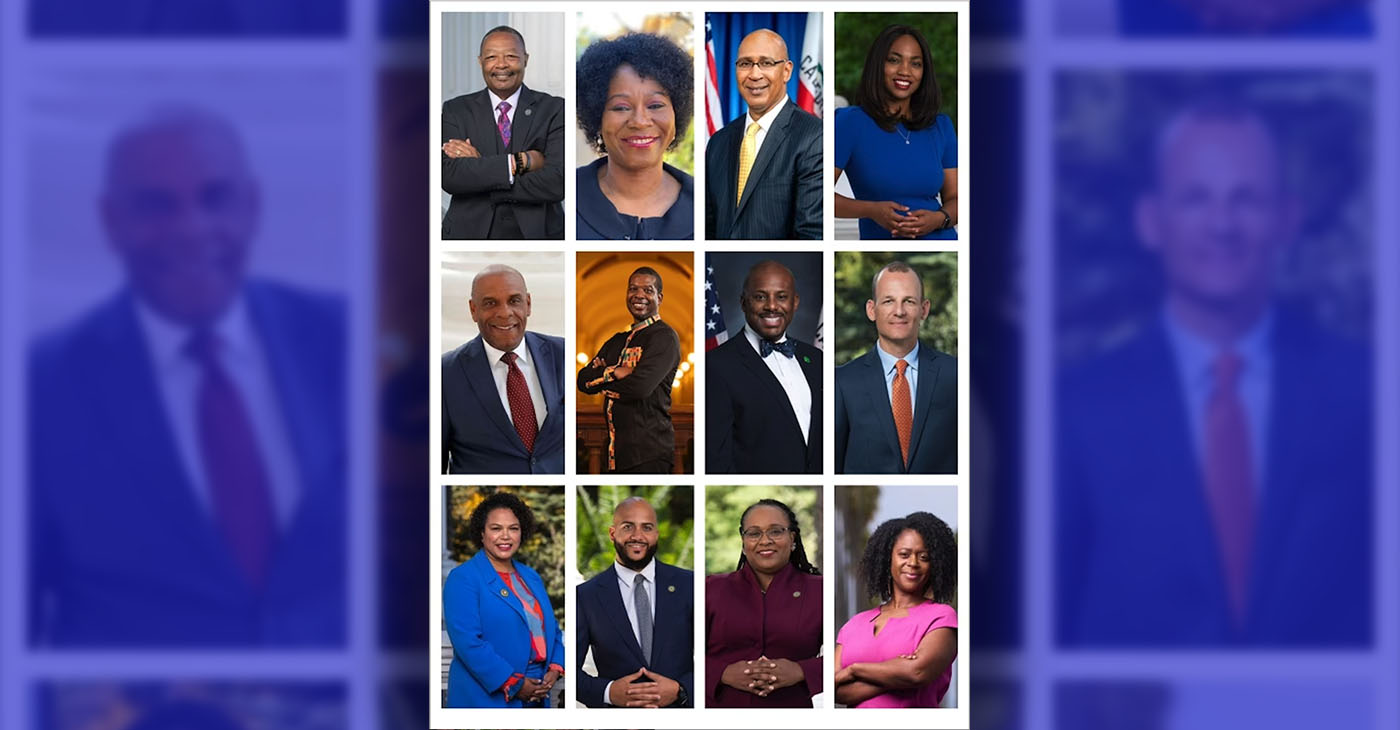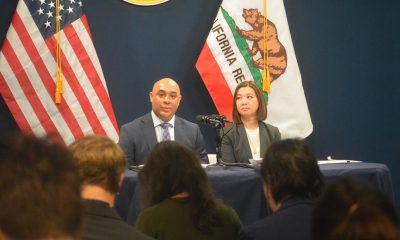Activism
Leading with Lawmaking: Six Questions for the California Legislative Black Caucus

By Antonio Ray Harvey | California Black Media
The California Legislative Black Caucus (CLBC) was established in 1967 when African American members of the California Legislature, under the leadership of former State Sen. Mervyn Dymally, came together to address issues faced by Black Californians.
The origins of the CLBC date back to 1918 when Frederick M. Roberts was elected to the California State Assembly. Roberts was the first African American to serve in the California State Legislature. In those early years, legislative efforts focused on abolishing laws and policies that restricted African Americans from fully exercising their civil, social and political rights.
During the 1960s, members believed that a caucus representing concerns of the African American community would provide political influence and visibility far beyond their numbers.
Today, the CLBC consists of 12 members.
During the 2024 legislative session, the CLBC hopes to secure funding for critical programs and organizations working to improve the lives of Black Californians.
California Black Media spoke with Assemblymember Lori D. Wilson (D-Suisun City), chair of the CLBC, about the organization’s priorities, challenges and plans for the next legislative session.
What does your organization do to improve the lives of Black people in California?
The 12 members of the California Legislative Black Caucus collaboratively develop and advocate for policies addressing economic justice, education, healthcare, criminal justice reform, and other issues impacting Black Californians. In 2024, the Caucus is prioritizing a reparations legislative package in response to the historic two-year Reparations study and report.
What was your greatest success over the course of the last year?
In 2023, the Caucus achieved legislative success by securing significant investments for institutions and programs supporting Black lives and advancing justice totaling more than $320 million dollars. Additionally, we introduced 10 legislative priorities, with three chartered into law.
Our nonprofit arm raised close to $3 million, funding our signature events and programs, like our annual Frederick Roberts college scholarship program, which supported 150 students this year with $3,500 awards, and our annual African American Leaders for Tomorrow program at California State Dominguez Hills.
In your view, what is the biggest challenge Black Californians face?
Housing, education, public safety and equity across the board remain the most significant challenges.
What was your organization’s biggest challenge?
Despite our best efforts to pool resources and collaborate with strategic partners, the ongoing challenge is the insufficient funding to address the breadth of issues faced by Black communities.
Does your organization support or plan to get involved in the push for reparations in California?
Absolutely. We are actively preparing for the 2024 legislative fight for reparations. Two of our caucus’s seasoned legislators, Sen. Bradford and Assemblymember Jones-Sawyer, served on the reparations task force. From the two-year study, we have created a framework to achieve legislative and budget wins as well as to work collaboratively with strategic partners up and down the state.
How can more Californians of all backgrounds get involved in the work you’re doing?
We encourage all Californians to support Black legislators and join the movement to advocate for a better California for all, ensuring fair, just and equitable representation. Participation is crucial for creating positive and transformational change in California.
Activism
Oakland Post: Week of June 4 – 10, 2025
The printed Weekly Edition of the Oakland Post: Week of June 4-10, 2025

To enlarge your view of this issue, use the slider, magnifying glass icon or full page icon in the lower right corner of the browser window.
Activism
Remembering George Floyd
BLACKPRESSUSA NEWSWIRE — Minnesota State Attorney General Keith Ellison acknowledges that the Floyd case five years ago involved a situation in which due process was denied, and five years later, the president is currently dismissing “due process. “The Minnesota Atty General also says, “Trump is trying to attack constitutional rule, attacking congressional authority and judicial decision-making.” George Floyd was an African American man killed by police who knocked on his neck and on his back, preventing him from breathing.

By April Ryan
BlackPressUSA Newswire
“The president’s been very clear he has no intentions of pardoning Derek Chauvin, and it’s not a request that we’re looking at,” confirms a senior staffer at the Trump White House. That White House response results from public hope, including from a close Trump ally, Georgia Congresswoman Marjorie Taylor Greene. The timing of Greene’s hopes coincides with the Justice Department’s recent decision to end oversight of local police accused of abuse. It also falls on the fifth anniversary of the police-involved death of George Floyd on May 25th. The death sparked national and worldwide outrage and became a transitional moment politically and culturally, although the outcry for laws on police accountability failed.
The death forced then-Democratic presidential candidate Joe Biden to focus on deadly police force and accountability. His efforts while president to pass the George Floyd Justice in policing act failed. The death of George Floyd also put a spotlight on the Black community, forcing then-candidate Biden to choose a Black woman running mate. Kamala Harris ultimately became vice president of the United States alongside Joe Biden. Minnesota State Attorney General Keith Ellison prosecuted the cases against the officers involved in the death of Floyd. He remembers,” Trump was in office when George Floyd was killed, and I would blame Trump for creating a negative environment for police-community relations. Remember, it was him who said when the looting starts, the shooting starts, it was him who got rid of all the consent decrees that were in place by the Obama administration.”
In 2025, Police-involved civilian deaths are up by “about 100 to about 11 hundred,” according to Ellison. Ellison acknowledges that the Floyd case five years ago involved a situation in which due process was denied, and five years later, the president is currently dismissing “due process. “The Minnesota Atty General also says, “Trump is trying to attack constitutional rule, attacking congressional authority and judicial decision-making.” George Floyd was an African-American man killed by police who knocked on his neck and on his back, preventing him from breathing. During those minutes on the ground, Floyd cried out for his late mother several times. Police subdued Floyd for an alleged counterfeit $20 bill.
Activism
Oakland Post: Week of May 28 – June 30, 2025
The printed Weekly Edition of the Oakland Post: Week of May 28 – June 3, 2025

To enlarge your view of this issue, use the slider, magnifying glass icon or full page icon in the lower right corner of the browser window.
-

 Activism4 weeks ago
Activism4 weeks agoAfter Two Decades, Oakland Unified Will Finally Regain Local Control
-

 Activism4 weeks ago
Activism4 weeks agoOakland Post: Week of May 14 – 20, 2025
-

 Alameda County4 weeks ago
Alameda County4 weeks agoOakland Begins Month-Long Closure on Largest Homeless Encampment
-

 Activism4 weeks ago
Activism4 weeks agoNew Oakland Moving Forward
-

 Barbara Lee4 weeks ago
Barbara Lee4 weeks agoWNBA’s Golden State Valkyries Kick Off Season with Community Programs in Oakland
-

 Activism4 weeks ago
Activism4 weeks agoEast Bay Community Foundation’s New Grants Give Oakland’s Small Businesses a Boost
-

 Bo Tefu4 weeks ago
Bo Tefu4 weeks agoGov. Newsom Highlights Record-Breaking Tourism Revenue, Warns of Economic Threats from Federal Policies
-

 Bay Area4 weeks ago
Bay Area4 weeks agoChevron Richmond Installs Baker Hughes Flare.IQ, Real-time Flare Monitoring, Control and Reduction System




















































